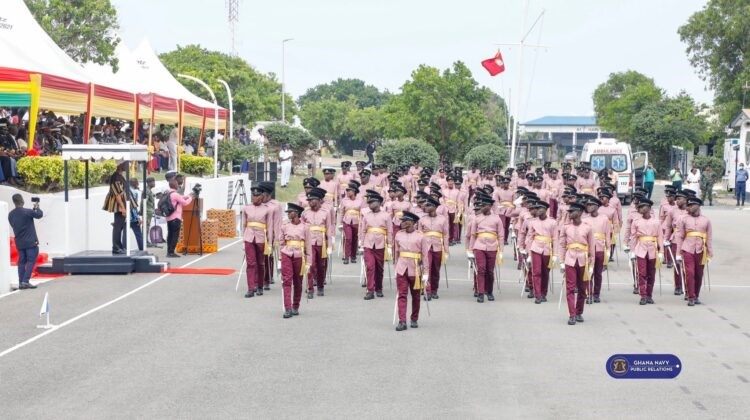A new era in Ghana’s fight against narcotics dawned today as 186 Cadets of the Narcotics Control Commission (NACOC) officially graduated from the Ghana Navy’s Leadership Training School (LTS).
After six months of intensive and rigorous training, these newly minted officers are poised to reinforce the nation’s counter-narcotics efforts.
The Passing Out Parade, a spectacle of discipline and precision, took place at the Dei-Arms Square of the Eastern Naval Command (ENC) in Tema.
The event drew a distinguished gathering of senior government officials, top military commanders, and key national security stakeholders, all underscoring the critical importance of this new cohort.
The graduation marked the completion of Basic Narcotics Cadet Course 8, a demanding 26-week program designed to sculpt recruits into disciplined, physically resilient, and tactically proficient officers.
Cadets were pushed to their limits, mastering a wide array of skills essential for combating the ever-evolving drug trade.
From narcotics detection and interdiction strategies to physical endurance, precision marksmanship, and mental fortitude under pressure, the course left no stone unturned.
According to the Ghana Navy, the curriculum was meticulously crafted to equip these officers with the tools needed to “confront and dismantle drug trafficking networks” both within and beyond Ghana’s borders.
Minister for the Interior, Hon. Mohammed Mubarak Muntaka, delivered a powerful keynote address, imploring the graduating cadets to uphold the highest standards of professionalism and integrity. He emphasized the critical nature of their roles in safeguarding national security and public health.
“Your service must be anchored in integrity, dedication, and professionalism. These are not mere words, but the values that will define your careers and determine the trust the public places in you,” the Minister advised, echoing the gravity of their new responsibilities.
Minister Muntaka also assured NACOC of the government’s unwavering support, pledging continuous investment in strengthening institutional capacity and providing essential resources for effective law enforcement operations.
“Government remains fully committed to enhancing the operational readiness of NACOC and will continue to invest in developing highly skilled personnel capable of neutralizing drug-related threats,” he affirmed.
The ceremony also celebrated individual excellence, acknowledging cadets who distinguished themselves throughout the demanding training.
Cadet Yamyolia Nahajat Ananga Wuntima emerged as the Overall Best Recruit and Best in Academics, a testament to her consistent excellence and unwavering discipline. Her dual recognition highlights the crucial balance between intellect and operational prowess required of NACOC officers.
Cadet Richard Kobetta earned the Best in Shooting award, showcasing superior marksmanship—a vital skill in the field.
Cadet Lawrence Edem Mensah was named Best in Physical Training and Drill (Male), while Cadet Margaret Kudiabor received the Best in Physical Training (Female), both recognized for their exceptional physical strength, coordination, and endurance.
These accolades underscore the holistic approach of NACOC’s training system, which seamlessly integrates academic rigor with physical and tactical discipline.
These 186 cadets are now fully certified and ready to assume operational responsibilities, significantly bolstering Ghana’s national drug interdiction efforts.
This enhanced collaboration between the Narcotics Control Commission and the Ghana Navy is a cornerstone of a broader national strategy to forge a unified front against drug trafficking.
As drug networks grow increasingly sophisticated and interconnected, the government’s emphasis on personnel development is seen as the most sustainable path to crime prevention.
By graduating this new cohort, the Ghana Navy has reaffirmed its commitment to cross-sectoral cooperation, aiming to build an agile and well-trained national drug control force.
Leaders from both NACOC and the Navy stressed that these officers will form the “backbone of ongoing intelligence-led and community-based anti-narcotics campaigns.”
This milestone powerfully reinforces NACOC’s determination to cultivate a disciplined and skilled workforce, fully equipped to protect the nation against the evolving dynamics of the illicit drug trade.
The successful passing out was punctuated by impressive ceremonial drills, rousing military band performances, and meticulous reviews by senior officials, all reflecting the profound discipline and cohesion instilled in the cadets during their months of intensive training.
The Eastern Naval Command expressed immense satisfaction with the outcomes of Course 8, anticipating that its graduates will inject renewed energy and professionalism into Ghana’s anti-narcotics architecture.


